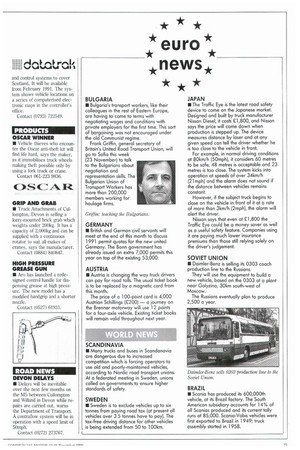* euro * * news * BULGARIA • Bulgaria's transport workers, like
Page 27

If you've noticed an error in this article please click here to report it so we can fix it.
their colleagues in the rest of Eastern Europe, are having to come to terms with negotiating wages and conditions with private employers for the first time. This sort of bargaining was not encouraged under the old Communist regime.
Frank Griffin, general secretary of Britain's United Road Transport Union, will go to Sofia this week (23 November) to talk to the Bulgarians about negotiation and representation skills. The Bulgarian Union of Transport Workers has more than 200,000 members working for haulage firms.
Griffin: teaching the Bulgarians. GERMANY
• British and German civil servants will meet at the end of this month to discuss 1 991 permit quotas for the new united Germany. The Bonn government has already issued an extra 7,000 permits this year on top of the existing 53,000.
AUSTRIA
IN Austria is changing the way truck drivers can pay for road tolls. The usual ticket book is to be replaced by a magnetic card from this month.
The price of a 100-point card is 4,000 Austrian Schillings (£200) — a journey on the Brenner motorway will use 12 points for a four-axle vehicle. Existing ticket books will remain valid throughout next year.
SCANDINAVIA
• Many trucks and buses in Scandanavia are dangerous due to increased competition which is forcing operators to use old and poorly-maintained vehicles, according to Nordic road transport unions. At a federated meeting in Sweden, unions called on governments to ensure higher standards of safety.
SWEDEN
• Sweden is to exclude vehicles up to six tonnes from paying road tax (at present all vehicles over 3.5 tonnes have to pay). The tax-free driving distance for other vehicles is being extended from 50 to /00km.
JAPAN
• The Traffic Eye is the latest road safety device to come on the Japanese market. Designed and built by truck manufacturer Nissan Diesel, it costs £1,800, and Nissan says the price will come down when production is stepped up. The device measures distance by laser and at any given speed can tell the driver whether he is too close to the vehicle in front.
For example, in normal driving conditions at 80km/h (50mph), it considers 60 metres to be safe; 48 metres is acceptable and 23 metres is too close, The system kicks into operation at speeds of over 34km/h (21 mph) and the alarm does not sound if the distance between vehicles remains constant.
However, if the subject truck begins to close on the vehicle in front of it at a rate of more than 3km/h (2mph), the alarm will alert the driver.
Nissan says that even at £1,800 the Traffic Eye could be a money saver as well as a useful safety feature. Companies using it are paying much lower insurance premiums than those still relying solely on the driver's judgement.
SOVIET UNION • Daimler-Benz is selling its 0303 coach production line to the Russians.
They will use the equipment to build a new vehicle, based on the 0303 at a plant near Golyzino, 30km south-west of Moscow.
The Russians eventually plan to produce 2,500 a year.
BRAZIL
• Scania has produced its 600,000th vehicle, at its Brazil factory. The South American subsidiary accounts for 14% of all Scanias produced and its current tally runs at 85,000. Scania-Vabis vehicles were first exported to Brazil in 1949; truck assembly started in 1958.
















































































